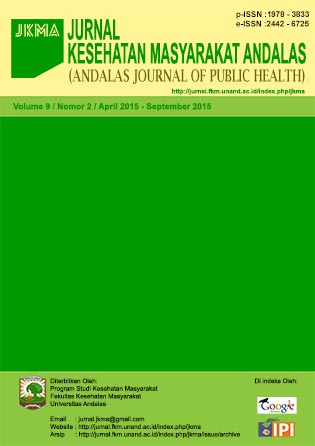Abstrak
Penelitian ini meneliti intensi perilaku pengelolaan sampah berkelanjutan pada siswa sekolah dasar menggunakan kerangka Teori Perilaku Berencana. Tujuan penelitian ini adalah untuk mengetahui faktor-faktor yang berhubungan dengan intensi perilaku pengelolaan sampah berkelanjutan. Populasi dan sampel dalam penelitian ini adalah siswa sekolah dasar di Kota Padang, Sumatera Barat. Data yang dikumpulkan untuk penelitian ini dianalisis menggunakan Structural Equation Modelling (SEM). Hasil penelitian ini menyatakan bahwa pengetahuan tentang pengelolaan sampah berkelanjutan memiliki hubungan yang signifikan dengan sikap terhadap pengelolaan sampah berkelanjutan. Sikap terhadap pengelolaan sampah berkelanjutan, norma subjektif dan perceived behavioral control (PBC)  juga memiliki hubungan yang signifikan dengan intensi perilaku pengelolaan sampah berkelanjutan. Studi ini telah membantu dalam memahami kekuatan relatif dari faktor determinan intensi perilaku pengelolaan sampah berkelanjutan. Kekuatan hubungan yang paling besar adalah antara PBC dengan intensi, diikuti oleh hubungan antara norma subjektif dengan intensi, dan yang paling lemah adalah hubungan antara sikap dengan intensi. Temuan ini memiliki implikasi penting bagi pihak sekolah serta bagi para pembuat kebijakan.
Referensi
World Bank. What A Waste : A Global Review of Solid Waste Management. Washington, DC. 2012.
Miller G. Living in The Environment : Solid and Hazardous Waste (Vol 13, Ch.). Pasivic Grove, USA: Brookes/Cole Thomson. 2004
Selin E. Solid waste management and health effects - A qualitative study on awareness of risks and environmentally significant behavior in Mutomo , Kenya. UMEA Universitet. 2013.
Sankoh FP, Yan X, Tran Q. Environmental and Health Impact of Solid Waste Disposal in Developing Cities : A Case Study of Granville Brook. Journal of Environmental Protection, 2013(July), 665–670. 2013
Apinhapath C. Community Mapping and Theory of Planned Behavior as, 2014, 1–8. 2014
Ajzen I. The theory of planned behavior. Organizational Behavior and Human Decision Processes. doi:10.1016/0749-5978(91)90020-T. 1991.
Santoso S. Konsep Dasar dan Aplikasi SEM dengan AMOS22. Jakarta: PT Elek Media Komputindo. 2014
Ferdinand A. Structural Equation Modelling dalam Penelitian Manajemen. Semarang: Badan Penerbitan Universitas Diponegoro. 2002.
Hair JF, Black WC, Babin BJ, Anderson RE, Tatham RL. Multivariate Data Analysis. Prentice Hall (p. 816). 2009.
Ramayah T, Lee JWC, Lim S. Sustaining the environment through recycling: An empirical study. Journal of Environmental Management, 102, 141–147. doi:10.1016/j.jenvman.2012.02.025. 2012.
Kumar B. A Theory of Planned Behaviour Approach to Understand the Purchasing Behaviour for Environmentally Sustainable Products. 2012.
Sidique SF, Joshi SV, Lupi F. Factors influencing the rate of recycling: An analysis of Minnesota counties. Resources, Conservation and Recycling, 54, 242–249. doi:10.1016/j.resconrec.2009.08.006. 2010.
Cheung SF, Chan DKS, Wong ZSY. Reexamining the Theory of Planned Behavior in Understanding Wastepaper Recycling. Environment and Behavior. doi:10.1177/00139169921972254. 1999.
Chaisamrej R. The Integration of The Theory of Planned Behaviour, Altruism, and Self-Construal: Implications for Designing Recycling Campaigns in Individualistic and Collectivistic Societies. University of Kentucky, Lexington, Kentucky. 2006.
Chan RYK, Lau LBY. Explaining Green Purchasing Behavior : A Cross-Cultural Study on American and Chinese Consumers. Journal of International Consumer Marketing, 14, 9–40. doi:10.1300/J046v14n02. 2001.
Mahmud SND, Osman K. The determinants of recycling intention behavior among the Malaysian school students: an application of theory of planned behaviour. Procedia-Social and Behavioral Sciences, 9, 119–124. doi:10.1016/j.sbspro. 2010.
Authors who publish with this journal agree to the following terms:
- Authors retain copyright and grant the Andalas Journal of Public Health right of first publication with the work simultaneously licensed under a Creative Commons Attribution License (CC BY-SA 4.0) that allows others to share (copy and redistribute the material in any medium or format) and adapt (remix, transform, and build upon the material) the work for any purpose, even commercially with an acknowledgement of the work's authorship and initial publication in Andalas Journal of Public Health.
- Authors are able to enter into separate, additional contractual arrangements for the non-exclusive distribution of the journal's published version of the work (e.g., post it to an institutional repository or publish it in a book), with an acknowledgement of its initial publication in Andalas Journal of Public Health.
- Authors are permitted and encouraged to post their work online (e.g., in institutional repositories or on their website) prior to and during the submission process, as it can lead to productive exchanges, as well as earlier and greater citation of published work (See The Effect of Open Access).

